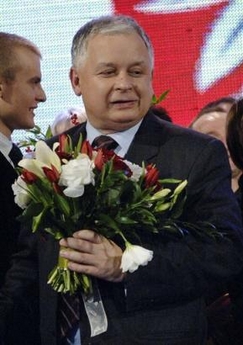Lech Kaczynski's election victory brings uncertainty to Poland's place in Europe
The new Polish president will do his best to adjourn the introduction of the European currency

The final results from Poland's presidential run-off on Monday confirmed previous expectations. Lech Kaczynski, the mayor of Warsaw and one of the leaders of the Polish conservative party, obtained about 55 percent of votes and thus became the newly elected Polish president. Kaczynski's rival, Donald Tusk, was lacking ten percent behind. The inauguration of the new Polish president is set to take place on December 23. 
Lech Kaczynski's victory became clear already during exit polls: the gap between the two contenders was fluctuating on the level of ten percent, although Tusk never managed to catch up with his rival. Incumbent Polish President Alexander Kwasniewsky congratulated Kaczynski on the victory even before the official announcement of the voting results. About 51 percent of Polish citizens came to the polls yesterday, which was higher than the turnout registered during the first round of voting.
Lech Kaczynski's victory became possible owing to the activity of the regional electorate (40 percent of the country's population), whereas Donald Tusk was leading in Poland's large cities, including Warsaw, the capital. One may not say that the rivals enjoyed a universal support in certain regions of Poland, although it is clear that the country is splitting against the background of contrary views regarding Poland's future in Europe.
Lech Kaczynski and his twin brother Jaroslaw, who declined the position of the prime minister after the victory in the parliamentary elections for the sake of his brother's political career, can be characterized as European skeptics. Kaczynski brothers do not wish to deprive Poland of a large number of privileges and hand them over to the European Committee or the European Parliament. They also want to adjourn the introduction of the single European currency: Poland will not be ready for the euro even in 2010, according to their opinion. They continuingly emphasize the important role of the Catholic Church in the country: Lech Kaczynski repeatedly banned gay pride parades in Warsaw, when he took the position of the city mayor. To crown it all, Kaczynski promised to support the Polish peasants, who suffered from tough competition with West European agricultural companies.
Donald Tusk was a proponent of European integration and free market, on which Polish goods would have no chance to compete with French and German products, for example. Tusk's followers will participate in the formation of the coalition government of Poland headed by Kazimierz Marcinkiewicz (a member of Lech Kaczynski's party).
As for the international political course of the new Polish president, it will most likely have a strong pro-American orientation. Lech Kaczynski stated on numerous occasions that Poland would have to cooperate with the USA and NATO to be able to defend its interests in the relations with Russia and Germany. Kaczynski harshly criticized Angela Merkel's suggestion to open the museum of exiled nations in Berlin (the museum would be devoted to the ousting of Germans from Poland and Czechoslovakia in 1945-1947). He particularly stated that Poland could easily open the museum of Nazi atrocities in Warsaw.
Poland's relations with Russia have been seriously aggravated with a series of violent attacks against diplomats and journalists of the two countries. The new president of Poland will probably take efforts to add more fuel to the fire. Lech Kaczynski has already stated that he would struggle to retrieve historical justice and would particularly ask the Russian administration to apologize for many years of socialist regime in Poland.
Vadim Trukhachev
AP photo
You can discuss this article on Pravda.Ru FORUM
Subscribe to Pravda.Ru Telegram channel, Facebook, RSS!


